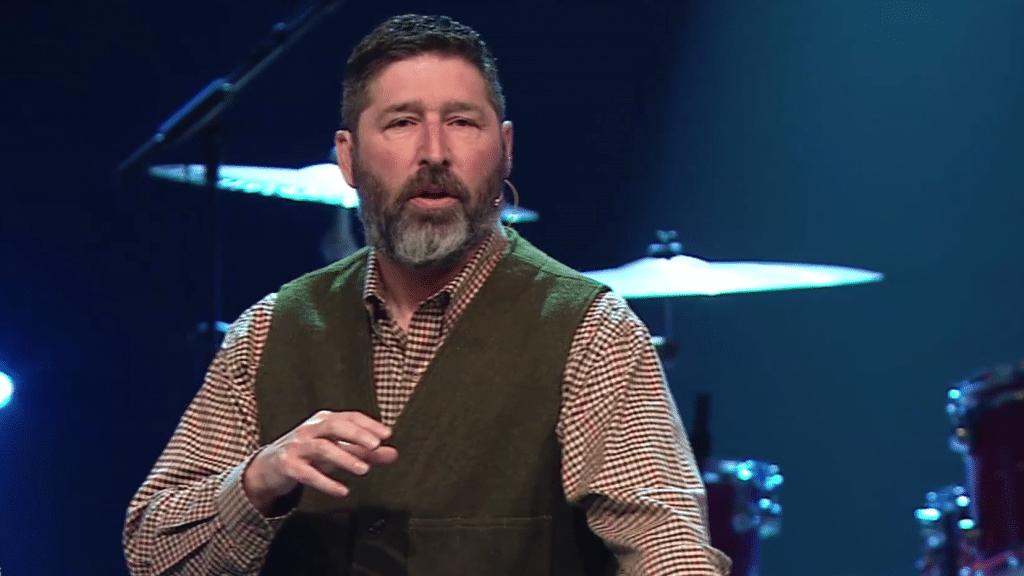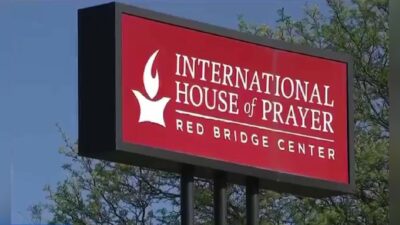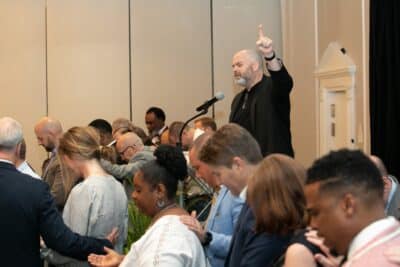A multisite church in northeastern Ohio has parted ways with its senior pastor, Rev. Tim Armstrong, after it says an investigation substantiated “claims against Pastor Tim of harshness and fear-based leadership.”
The Chapel, a church of more than 6,000 across seven campuses including its largest in Akron, published a statement on its website last week saying Armstrong had resigned after the church’s trustees voted that he could not be restored to his role at The Chapel. He had been on administrative leave since about May 22 as the church entered a “crisis” of leadership.
Third-party fact-finders investigated the claims and are preparing a summary of their findings to be presented to the congregation, The Chapel communications director Melissa Trew said. She expected that would come later this month and would also be posted to the church’s website. But what trustees have learned so far was “troubling enough” for them to unanimously affirm Armstrong couldn’t be reinstated as senior pastor, she said.
Armstrong didn’t reply when The Roys Report reached out to him through his Instagram account and his radio ministry, The Worthy Walk. In the July 30 statement from church trustees, he said his family was “deeply grieved” by the circumstances. “My greatest desires are for the unity of the church and staff and therefore agree with the Trustee’s that it would be best for me to resign my position as Senior Pastor of The Chapel,” he wrote.
The crisis erupted May 20 when Armstrong asked the pastor of one of the church’s two biggest campuses, Mike Castelli, to resign, reportedly because he’d fostered a staff culture at the campus “that did not support Pastor Tim’s overall vision for the church.”
Your tax-deductible gift helps our journalists report the truth and hold Christian leaders and organizations accountable. Give a gift of $30 or more to The Roys Report this month, and you will receive a copy of “Hurt and Healed by the Church” by Ryan George. To donate, click here.
“Pastor Tim felt that these cultural differences were contributing to a breach in the foundational unity of our church,” according to the church’s July 30 statement. “When Pastor Mike declined to resign, Pastor Tim terminated Pastor Mike’s employment.”

A statement on the church’s website stated in May that Castelli’s termination “was in no way related to immoral, illegal, unethical, or sinful conduct of any kind,” The Akron Beacon Journal reported at the time. The statement no longer appears on the website.
But around the same time Castelli was fired, The Chapel’s trustees learned of the claims against Armstrong, according to the church’s July 30 statement.
The church hasn’t described the claims in detail. Trew, the church’s spokeswoman, said she hadn’t seen the first draft of the fact-finders’ report so she couldn’t say how many victims the church had found or how far back the behavior extended.
The church’s trustee chairman convened a committee to investigate whether Armstrong’s actions were appropriate, and both Armstrong and Executive Pastor Jim Mitchell went on voluntary administrative leave. The acting executive reinstated Castelli and put him on administrative leave, too, while the trustee committee investigated.
The committee hired The Center Consulting Group as fact-finders. The committee heard The Center’s formal report the week of July 5, according to a July 10 statement from the church. That covered “in-depth findings and a variety of recommendations.” Trew said she wasn’t at that meeting.
Based on the findings, the trustee committee unanimously recommended that Armstrong was “unable to fulfill the duties of senior pastor and therefore cannot be restored to the role of senior pastor of The Chapel” according to the church’s constitution. The full trustee board voted to affirm that and Armstrong agreed to resign effective immediately, the church’s July 30 statement indicated.

The church hasn’t stated the date of the board vote or Armstrong’s resignation. Trew declined to provide that to The Roys Report, noting that the congregation hadn’t been told that yet either. She expected those dates to be included in the fact-finders’ summary later this month.
Armstrong had been lead pastor since May 2014, according to an archived Beacon Journal report. He was the fifth lead pastor in The Chapel’s 87-year history.
Armstrong had previously established himself as a founding pastor of Crossroads Community Church in Mansfield, Ohio, about an hour south of Akron. There, he’d started Crossroads with a group of 30 people right after graduating from seminary in 1996. Under his leadership, the church plant had grown to be one of the region’s largest congregations by 2014, with more than 2,000 attending weekly, according to a report in the Mansfield News-Journal.
The Roys Report reached out to Crossroads, but hasn’t heard back.
Armstrong also runs a radio ministry, The Worthy Walk, which airs on Christian radio stations in Canton, Barberton and Cincinnati/Dayton, Ohio, and Fort Smith, Arkansas, according to the ministry’s website. The program is also carried on several Moody Radio stations in northeast Ohio and Pennsylvania.

Trew said Armstrong operates The Worthy Walk independently of The Chapel.
The trustee committee is now turning to its questions about staff unity and other issues related to the other two pastors on leave at The Chapel, Mitchell and Castelli, according to the July 30 statement.
“Our hope is to follow up with each of them individually and then make a prayerful decision on how best to proceed,” the trustees said in the statement.
Trew said she’d “been on her knees in prayer many times” and knew others had, too.
“We are walking by faith and trusting God in the midst of this,” she said. “He can do effortlessly that which is impossible for us, so we are trusting him for healing for those who’ve been hurt, by people or by groups of people who have made hurtful choices.
“We are trusting that God will provide abundantly when it comes to restoration” for the congregation and remaining staff, many of whom are confused or have less confidence the church than they used to, Trew said. The church is also seeking God’s provision “when it comes to wisdom for next steps and decisions.”
“The best way for people who know us and love us to rally around us is always through prayer,” she said.
 Sarah Einselen is an award-winning writer and editor based in Texas.
Sarah Einselen is an award-winning writer and editor based in Texas.




















15 Responses
“But around the same time Castelli was fired, The Chapel’s trustees learned of the claims against Armstrong, according to the church’s July 30 statement.”
+++++++++++++++++
The Chapel’s trustees were blindsided? Caught completely off-guard? A total surprise?
[ . . . ]
I wonder if The Chapel has congregational government or elder-rule government. Though the former is often slow and cumbersome, the latter is unscriptural.
Proponents of “elder-rule” church governance say their view is scriptural and even BIBLICAL. It sure is a funny old world.
Elders and their qualifications are discussed in the New Testament. My father was an elder in a church, with a few other elders, from when I was born until I was about 20 years old.
I’ve been part of congregation government churches in my adult years. They usually have had only one pastor, with perhaps an assistant, along with a member-elected board.
Having elders, in my experience, means that everything doesn’t just fall on one person. The boards, in my experience, never carried any of the load of ministering to the congregation or the community. With elders, along with deacons (the qualifications and duties of also discussed in the New Testament), the load of ministry is distributed.
I guess there can be negatives and positives for both models, but to assert that having elders lead a church isn’t Scriptural is incorrect.
Ethan Rogati, I agree with you about the potential advantages and disadvantages of different forms of church organization. All groups say their way is scriptural, and that’s okay with me.
A distinction must be made between “Elder-led” and “elder-rule.” These are two very different forms of church government. Our church has congregational polity, but is elder-led. The final decision for major things lies solely with the congregation, while the congregation delegates certain decisions to the elders. Having elders is not the issue (it’s pretty clear in the text that there were elders in the NT church), the issue is in how they function in the church.
A few of these types of stories recently give me hope that the tide is turning against the authoritarian pastor model! How wonderful if the church would return to the Scriptural qualifications for an elder, which include being gentle, hospitable, and displaying self-control.
A big part of the problem is that the church has absorbed the aristocratic ‘leader’ model from business and politics. Let’s get this straight. We don’t have ‘leaders’ in this mould in the church. The governance model in the scriptures has nothing to do with Harvard Business Review (and even this has gone soft on the aristocrat model over recent decades) or Wall Street. First off we are all servants. Thus the old word ‘minister’. We have positions of responsibility in the church. Responsibility. That’s the word to tattoo on the insides of your eyelids. Then we serve each other as those with a variety of gifts. The more responsibility, the more people you SERVE. And while we are at it we can toss the oxymoronic (or just plain ol’ ordinary moronic) ‘servant-leader’ notion. This too, harkens to the ‘aristocrat’ concept. Rather, our Leader is Christ. We all serve each other.
I wholeheartedly with your comment David, particularly the focus on responsibility, but I think the bad theology of the authoritarian pastor came from within the church itself. There is a direct line from the shepherding movement of the 1970s and the blighted teachings of Bill Gothard to today’s leaders.
Along the way, a self-serving interpretation of male headship (how convenient to come up with a theology that puts yourself in charge of everything!) and the prideful assertions of Calvinism (I am God’s sovereign choice to rule you and if you oppose me you oppose God) removed or minimized protective theologies like the leadership of the Holy Spirit and the sanctity of the conscience of the individual believer that had previously helped safeguard congregations and individual parishioners against abuse.
The final nail in the coffin in the denomination I grew up in (Southern Baptist) was to remove the primacy of Jesus himself as the standard by which the Bible is to be interpreted. Authoritarian pastors could no longer be challenged simply as not displaying the meekness, compassion, and service of Christ, and would frequently measure themselves instead by the prophets and/or kings of the Old Testament. It is notable that many of these sorts of wolves (for they are not shepherds) rarely preach from the red-letter words of Jesus.
As a faithful member of an SBC church, there is a lot of misinformation in this post. I’m sorry you are jaded or had a bad experience, but you have connected dots that aren’t even part of the same picture. Bill Gothard had a terrible hermeneutic, and that should have been identified earlier. But that has nothing to do with male headship (which is a textual issue) or calvinism (again, a textual issue). Your characterization of both is faulty and echoes the political garbage of our day (if you disagree with me, then you must be characterized by the worst that your position has to offer).
For example, I could easily say that you as a non-calvinist must be a works-righteousness based Arminian who must live in constant fear that you will lose your salvation. Not saying you believe that at all, but that’s just what you did in your post.
Oh, and we preach from every part of Scripture, though we believe that every word of the text is inspired and are from God, so we don’t elevate red words above others…
Obviously our views differ, Brian. Bill Gothard’s teachings had everything to do with male headship, and Calvinism’s teachings on sovereignty have indeed been used by authoritarian pastors to lord over their flocks.
Unfortunately, the SBC is too busy trying to spin its declining membership numbers to take an honest look at the number of people that have left the denomination due to its embrace of both Calvinism and authoritarian pastors. Those two elements are often–though not always–linked.
[ . . . ]
I don’t disagree that the trustees being completely taken by surprise is implausible.
This exact story happened to my husband a year ago. He was asked to resign because he brought some issues to light and by doing that he was “disrupting the unity of the church”. When he declined to resign, he was fired in front of me and our children. We were immediately removed from all memberships, forms of communication, and the church directory. The pastor allegedly stated that my husband’s firing was “not due to a sin issue, but rather an insubordination issue”. Some people asked for a conciliator to come in and assess the church’s health but the pastor and his inner circle was not cooperative. That bullying and toxic church culture still thrives there, sadly.
In Chinese CCP-speak, “Disrupting Social Harmony”.
I was an attender of The Chapel. I saw this as a congregant, experienced Tim Armstrong’s leadership style personally as spiritual and leadership abuse. The trustees say they didn’t know about this, I don’t believe that. I saw pastors, staff and trustees who challenged his leadership in any manner were forced out of their position and they were replaced, continually, with those he thought wouldn’t challenge him. Their constitution makes it very difficult to remove a Sr. Pastor. Armstrong’s total and complete authority and control enabled his disposal of anyone who tried to question his leadership. The leaders had a very tough time getting to this point.